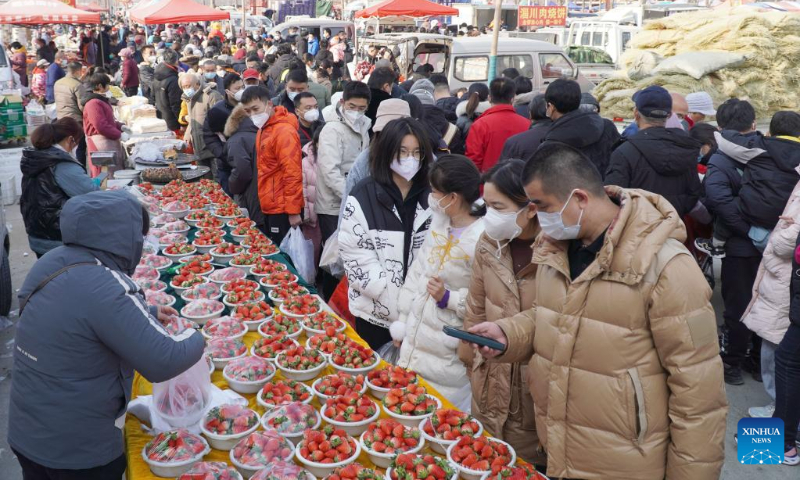
People buy strawberry in a market in Jinan, east China's Shandong Province, Jan. 2, 2023. The three-day New Year holiday witnessed a strong recovery in tourism, catering and retail sales across the country. Photo:Xinhua
China’s consumer market remained generally stable in 2022 with retail sales of nearly 44 trillion yuan ($6.49 trillion) despite the epidemic, and more measures are underway to boost consumption this year, according to the Ministry of Commerce (MOFCOM).
Vice Minister Sheng Qiuping said at a press conference on Thursday that the ministry has ramped up policy support in various sectors, including the secondhand vehicle market, and introduced measures to promote the consumption of green smart home appliances, especially in rural areas.
The ministry also accelerated the development of new consumption such as launching a New Year’s goods shopping festivals online.
Consumption upgrading has obviously emerged. Sales of cultural goods went up by 10.1 percent, sports and entertainment products up 10.8 percent and gold and silver jewelry up 27.3 percent, indicating that the pace of consumption upgrading is accelerating.
For the upcoming Spring Festival holidays, Sheng said the market is steady, with sufficient supplies and stable prices.
Inventories of daily necessities at large wholesale markets and chain supermarkets in many areas have increased by 20-30 percent compared with ordinary days and about 10 percent year-on-year, according to data monitored by the MOFCOM.
Retail sales in China fell 0.2 percent in 2022, with consumption contributing 32.8 percent of GDP growth, lower than 65.4 percent in 2021, the National Bureau of Statistics (NBS) said on Tuesday.
Sales of consumer goods rose 0.5 percent in 2022, while revenue for catering services decreased by 6.3 percent, according to the NBS.
In 2023, there is huge room for consumption to rebound and contribute to economic growth, experts said, as the economy is coming back on the right track following the nation’s optimized measures on COVID-19 prevention.
China downgraded management of COVID-19 from Class A to Class B as of January 8.
“Two fronts are the focal points under the current circumstances: how to spur consumption and how to better support the real estate sector,” Lian Ping, chief economist and head of the Zhixin Investment Research Institute, told the Global Times.
Lian believed that more tools aimed at improving the two sectors will be implemented.
More specific policies and tools to stimulate the economy are expected to be rolled out during the Two Sessions – China’s most important annual political gatherings – in March this year, according to Lian.




